Tuesday, May 01, 2007
Paper lays still, and lets anybody write anything
There are a lot of things that one learns when writing a blog for a couple of years. One is that the media is full of inaccuracies. That isn’t so much of a surprise though – to see that you only have to be an attentive reader.
A second thing that I have come to see may not be so obvious to non-bloggers is that much of what passes for scholarly work in academic or pseudo-academic journals is, well, non-sense. I have always assumed that people with PhDs who are trained in academic research and whose work is presumably thoroughly reviewed not just by editors but by academic peers would manage to get at least basic facts right.
Yes, I am familiar with the Sokel affair so I can believe some “scholarly” articles are non-sense. Still, I always thought they were very much the exception. Yet in spending years following Venezuela’s political situation closely and reading virtually every “scholarly” article written about it I have been very disappointed to learn they are all too common.
The most recent example was “Venezuela: Crowding out the opposition” by Javier Corrales and Michael Penfold published in the Journal of Democracy (the article can be found on an opposition blog here). The main point of this article is that Hugo Chavez inherited a fairly well functioning democracy, promised to improve it and instead has spent the past eight years doing little but undermining the rest of the government and consolidating power in himself.
Of course, scholars can present whatever ideas they wish and indeed they should present ideas that their research leads them to believe are true. Unfortunately, that seems to be very far removed from what Corrales and Penfold have done. Rather, they are apparently so ill-informed or careless that they get basic facts wrong while grossly distorting others.
Some of their errors are so silly they seem like the type that earn high school students “D”s on term papers . For example, in one passage they state that the Venezuelan economy shrank 17.6% in 2003. In reality it declined 9.2%. And to think one of the authors has been a professor at Venezuela’s premier business school. Yikes.
Moving beyond the juvenile (or typesetting) errors things get more serious. For example, in their desire to claim the Venezuelan government is untransparent and unaccountable they state:
A fund possibly holding billions of dollars about which there is no information? That sounds serious.
Yet it is completely untrue. If one takes the time to read the year end “Memoria Y Cuenta” of the Finance Ministry, which can easily be found here, you will note that there is an entire section on FONDEN (beginning on page 171) that gives how much the fund has received, how much has been spent, what it was spent on, how much is left, and even exactly how the unspent portion is invested. So much for “There is no information on how or even whether this money has been used.”
Here is a sample of the information it provides:
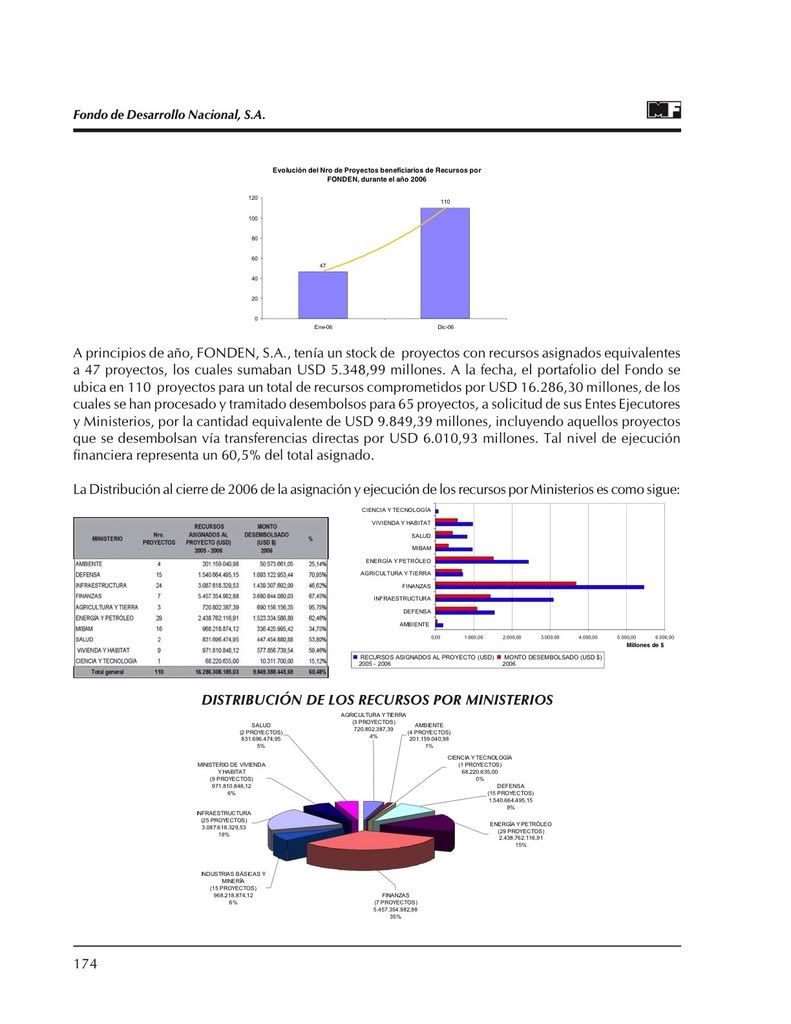
And a faculty member at Venezuela’s premier business school couldn’t find this? Not good. Though truth is I suspect they didn’t want to find this – it doesn’t fit in with their pre-conceived, and false, notions.
Worse than un-transparent they go so far as to assert that the government is corrupt. No, they don’t provide any specific evidence of corruption. But they do point out one rather damning fact:
While having “ no competitive bidding for most government contracts” would indeed leave the door wide open for abuse it has nothing to do with the reality. Government contracts in Venezuela are awarded by competitive bidding. It is hard to miss this fact reading Venezuelan newspapers as they are full of mundane advertisements such as these from the government requesting bids:
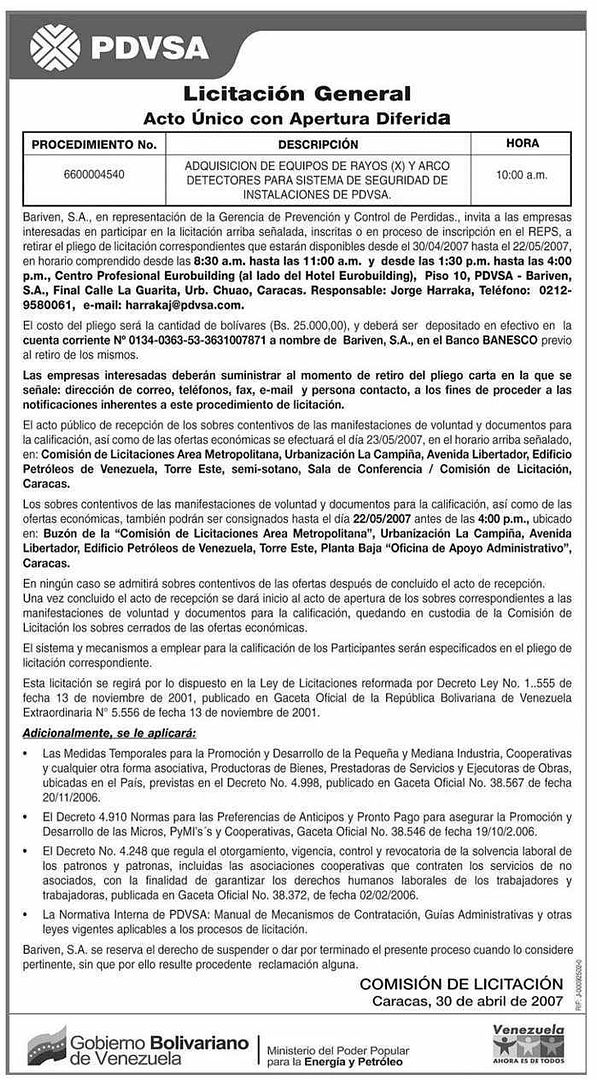
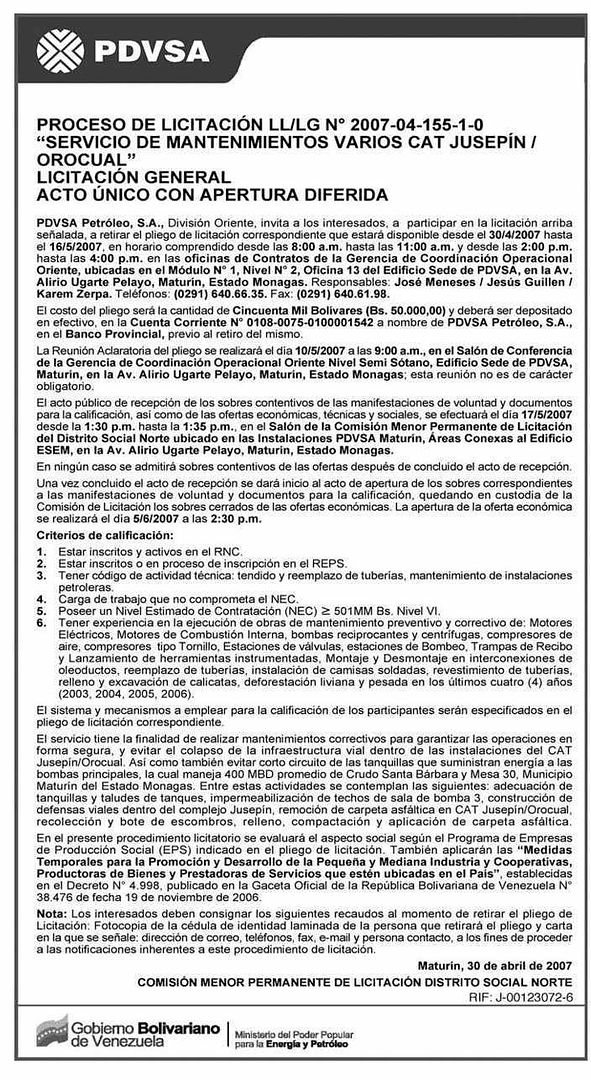
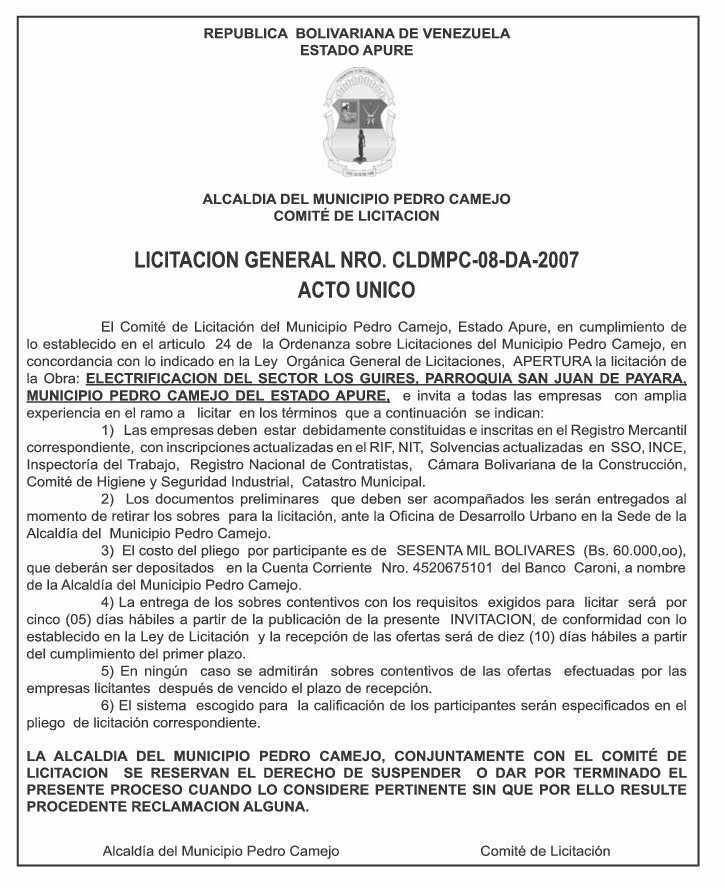
And then there is this one:
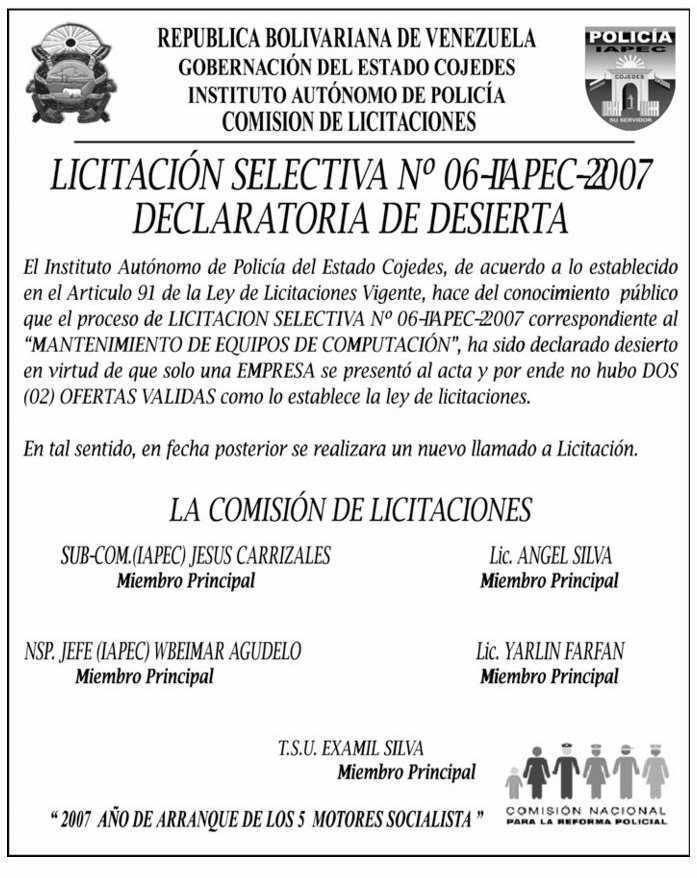
In this one a local police force had put out a bid for computer maintenance services. They point out they didn’t get two valid bids, AS REQUIRED BY LAW, and hence are starting the bidding process all over. Are we really to believe the authors don’t know that all contracts are bid out in Venezuela? And to think one of the authors spent time in Caracas as a Fullbright Scholar. Did he never pick up a newspaper the whole time he was there?
Unfortunately, one of the worst examples of their mendacity (but by no means only one) is yet to come. Trying to discredit the current National Assembly they claim that it was elected via a flawed process:
Funny, but I was there, and that is not what I recall happening. What I recall was that a flaw that created the remote possibility of determining how people voted was indeed found. The problem could be solved by not using the finger print machines. The opposition said it would participate in the elections if those machines were re-moved, the electoral authorities had them removed, and the opposition boycotted the election anyways strongly hinting at them having other motives for their boycott.
But my recollection of what happened is so different from what they described I started to wonder if maybe I was mistaken. As luck would have it the election was observed by the European Union and they wrote a full report.
On page 26 of their report they describe the events:
Hmm, so it turns out that the chance the secrecy of the vote being would be compromised was “remote” and the electoral authorities responded in a “sensible and appropriate” way. I guess my memory is better than that of Penfold and Corrales. Moreover, the E.U. observers appear to share my doubts about why the opposition really withdrew (page 4):
Unfortunately I have to admit I don’t really believe it is memory failure that is leading the authors to make blatantly false claims about what happened in the 2005 elections. Rather it seems their determination to paint Venezuelan elections as flawed and the National Assembly as not really legitimate forces them to make up completely ficticious series of events. Fortunately for them most of their readers will never bother to look up what really happened and never learn that what is "partial" is Corrales and Penfold's narrative, not the 2005 election.
It would be disconcerting even if these were the only errors and distortions in the article. But they aren’t. Rather there are dozens of them, as I’m sure the attentive and informed reader will surely note. Given that I have limited time and that this post touches on the failings of some in academia finding the rest will be left to the readers as a homework assignment.
It is possible to screw up a scholarly article by being lazy and getting your facts wrong. It is also possible to screw up a scholarly article by having strong pre-conceptions and falsifying information to make it fit those pre-conceptions. While it really is despicable for two university professors to have done that, in a certain sense, I don’t blame the authors. Yes they are both ignorant and mendacious. But they had a point they wanted to make, almost certainly for political reasons, and they were able to use this journal to make it.
Rather the people who are clearly at fault here work with the Journal of Democracy. Where were the editors? Where were the fact checkers? Where was the peer review that should never have let such an egregiously bad article never get published, or at least not without major revisions? Surely some people were asleep at the wheel.
Then again, maybe this is the sort of thing that this “journal” wishes to publish. It turns out the Journal of Democracy is associated with the National Endowment for Democracy. Its list of editors and advisers includes, Condoleezza Rice, Zbigniew Brzezinski, and Gonzalo Sánchez de Lozada among others. Funny, I’ve seen this “journal” at the local bookstore before and I never had any idea who was behind it.
So maybe we shouldn’t be too hard on Drs. Penhold and Corrales for being clueless and mendacious. They were writing for a journal that was probably looking for just those qualities. And they sure did give them their moneys worth.
|
A second thing that I have come to see may not be so obvious to non-bloggers is that much of what passes for scholarly work in academic or pseudo-academic journals is, well, non-sense. I have always assumed that people with PhDs who are trained in academic research and whose work is presumably thoroughly reviewed not just by editors but by academic peers would manage to get at least basic facts right.
Yes, I am familiar with the Sokel affair so I can believe some “scholarly” articles are non-sense. Still, I always thought they were very much the exception. Yet in spending years following Venezuela’s political situation closely and reading virtually every “scholarly” article written about it I have been very disappointed to learn they are all too common.
The most recent example was “Venezuela: Crowding out the opposition” by Javier Corrales and Michael Penfold published in the Journal of Democracy (the article can be found on an opposition blog here). The main point of this article is that Hugo Chavez inherited a fairly well functioning democracy, promised to improve it and instead has spent the past eight years doing little but undermining the rest of the government and consolidating power in himself.
Of course, scholars can present whatever ideas they wish and indeed they should present ideas that their research leads them to believe are true. Unfortunately, that seems to be very far removed from what Corrales and Penfold have done. Rather, they are apparently so ill-informed or careless that they get basic facts wrong while grossly distorting others.
Some of their errors are so silly they seem like the type that earn high school students “D”s on term papers . For example, in one passage they state that the Venezuelan economy shrank 17.6% in 2003. In reality it declined 9.2%. And to think one of the authors has been a professor at Venezuela’s premier business school. Yikes.
Moving beyond the juvenile (or typesetting) errors things get more serious. For example, in their desire to claim the Venezuelan government is untransparent and unaccountable they state:
The government has created special nontransparent funds, free of legislative oversight, that are believed to hold more than US$15 billion from the recent oil windfall. In 2005, the National Assembly approved a modification of the Central Bank law to create one such fund by transferring $6 billion from international re¬serves. Known as the Development Fund (FONDEN), it is controlled by the executive branch through the Ministry of Finance rather than the Central Bank (Venezuela’s Central Bank, like most, was designed to be relatively insulated from direct executive-branch influence). There is no information on how or even whether this money has been used.
A fund possibly holding billions of dollars about which there is no information? That sounds serious.
Yet it is completely untrue. If one takes the time to read the year end “Memoria Y Cuenta” of the Finance Ministry, which can easily be found here, you will note that there is an entire section on FONDEN (beginning on page 171) that gives how much the fund has received, how much has been spent, what it was spent on, how much is left, and even exactly how the unspent portion is invested. So much for “There is no information on how or even whether this money has been used.”
Here is a sample of the information it provides:

And a faculty member at Venezuela’s premier business school couldn’t find this? Not good. Though truth is I suspect they didn’t want to find this – it doesn’t fit in with their pre-conceived, and false, notions.
Worse than un-transparent they go so far as to assert that the government is corrupt. No, they don’t provide any specific evidence of corruption. But they do point out one rather damning fact:
Furthermore, in situations of radicalization it helps to have a mechanism for coopting military and perhaps also business elites, if only as a shield against coups. This might explain why in Venezuela there is no competitive bidding for most government contracts, and why few individuals close to the government have been jailed for corruption.
While having “ no competitive bidding for most government contracts” would indeed leave the door wide open for abuse it has nothing to do with the reality. Government contracts in Venezuela are awarded by competitive bidding. It is hard to miss this fact reading Venezuelan newspapers as they are full of mundane advertisements such as these from the government requesting bids:



And then there is this one:

In this one a local police force had put out a bid for computer maintenance services. They point out they didn’t get two valid bids, AS REQUIRED BY LAW, and hence are starting the bidding process all over. Are we really to believe the authors don’t know that all contracts are bid out in Venezuela? And to think one of the authors spent time in Caracas as a Fullbright Scholar. Did he never pick up a newspaper the whole time he was there?
Unfortunately, one of the worst examples of their mendacity (but by no means only one) is yet to come. Trying to discredit the current National Assembly they claim that it was elected via a flawed process:
As with voter registration, reforms regarding the actual voting system were partial. During the runup to the 2005 legislative elections, analysts had learned that officials could use polling-place fingerprintidentification machines together with the electronic voting machines themselves to find out how individuals had voted. The alarmed opposition asked for manual voting, but the CNE dismissed this request, argueing that the law required automated voting. At the last minute, the opposition withdrew from the race, leaving every seat in the National Assembly to be filled by pro-Chávez candidates.
Funny, but I was there, and that is not what I recall happening. What I recall was that a flaw that created the remote possibility of determining how people voted was indeed found. The problem could be solved by not using the finger print machines. The opposition said it would participate in the elections if those machines were re-moved, the electoral authorities had them removed, and the opposition boycotted the election anyways strongly hinting at them having other motives for their boycott.
But my recollection of what happened is so different from what they described I started to wonder if maybe I was mistaken. As luck would have it the election was observed by the European Union and they wrote a full report.
On page 26 of their report they describe the events:
A report on the findings of the meeting of 23 November was prepared by the national observers and political party representatives that attended the audit session and sent to the CNE. This report recognised that whilst the sequence of the
votes could be reconstructed this could only be achieved with access to either the hard drive of the VMs or their external memory (also called flash memory or pen-drive) and access to the encryption key that protects the data. If his sequence of the vote was then compared to the order that voters presented themselves at the VMs, individuals’ voting intentions could be reconstructed. At polling stations where SAVs were planned to be used, the order in which voters had presented themselves to vote could potentially have been determined if the two data sources were cross-checked. This possibility, while to be assessed as very remote, did indeed exist.
The consequent CNE decision to stop the use of the SAVs was indeed sensible and appropriate. The EU EOM was present at the audit session of 23 November and had the possibility to observe the events in its entirety. The possibility of endangerment of the secrecy of the vote was evaluated by EU EOM experts as remote. The breach
of the secrecy of the vote could only be possible if the sequence of both the identification of the voters and the votes cast was reconstructed. This reconstruction would require access to three different dispersed sources of
information by a qualified user. These sources are the VM memory, the SAVs memory and the entire encryption key code (divided among the political parties and the CNE) used in the system to protect the voting data. In addition to that, the
EU EOM is of the opinion that this possibility was truly due to a mistake from the CNE and Smartmatic and not to a fraudulent attempt to reconstruct the voting sequence.
Hmm, so it turns out that the chance the secrecy of the vote being would be compromised was “remote” and the electoral authorities responded in a “sensible and appropriate” way. I guess my memory is better than that of Penfold and Corrales. Moreover, the E.U. observers appear to share my doubts about why the opposition really withdrew (page 4):
In the election preparations, the CNE demonstrated a clear willingness to meet the
demands of the opposition in order to increase confidence in the process. Among
the main steps taken to reduce the opposition concerns over the automated voting
process, the CNE increased the number of polling stations to be audited from an
initial 33% to 45% and eliminated the use of the electronic voter lists.
The principle of automated voting is clearly enshrined in the legal framework.
However, the current development and applications of the automated voting
process have surpassed the law in various aspects. The discovery of a design flaw in the software of the voting machines, with the consequent remote possibility to violate the secrecy of the vote was dealt with by the CNE in a timely and adequate manner with the elimination of the fingerprint capturing devices. For this reason, the EU EOM took note with surprise of the withdrawal of the majority of the opposition parties only four days before the elections. The withdrawal took place after those parties had previously announced their participation to the process if the CNE would eliminate the use of the fingerprint capturing devices.
Unfortunately I have to admit I don’t really believe it is memory failure that is leading the authors to make blatantly false claims about what happened in the 2005 elections. Rather it seems their determination to paint Venezuelan elections as flawed and the National Assembly as not really legitimate forces them to make up completely ficticious series of events. Fortunately for them most of their readers will never bother to look up what really happened and never learn that what is "partial" is Corrales and Penfold's narrative, not the 2005 election.
It would be disconcerting even if these were the only errors and distortions in the article. But they aren’t. Rather there are dozens of them, as I’m sure the attentive and informed reader will surely note. Given that I have limited time and that this post touches on the failings of some in academia finding the rest will be left to the readers as a homework assignment.
It is possible to screw up a scholarly article by being lazy and getting your facts wrong. It is also possible to screw up a scholarly article by having strong pre-conceptions and falsifying information to make it fit those pre-conceptions. While it really is despicable for two university professors to have done that, in a certain sense, I don’t blame the authors. Yes they are both ignorant and mendacious. But they had a point they wanted to make, almost certainly for political reasons, and they were able to use this journal to make it.
Rather the people who are clearly at fault here work with the Journal of Democracy. Where were the editors? Where were the fact checkers? Where was the peer review that should never have let such an egregiously bad article never get published, or at least not without major revisions? Surely some people were asleep at the wheel.
Then again, maybe this is the sort of thing that this “journal” wishes to publish. It turns out the Journal of Democracy is associated with the National Endowment for Democracy. Its list of editors and advisers includes, Condoleezza Rice, Zbigniew Brzezinski, and Gonzalo Sánchez de Lozada among others. Funny, I’ve seen this “journal” at the local bookstore before and I never had any idea who was behind it.
So maybe we shouldn’t be too hard on Drs. Penhold and Corrales for being clueless and mendacious. They were writing for a journal that was probably looking for just those qualities. And they sure did give them their moneys worth.
|
